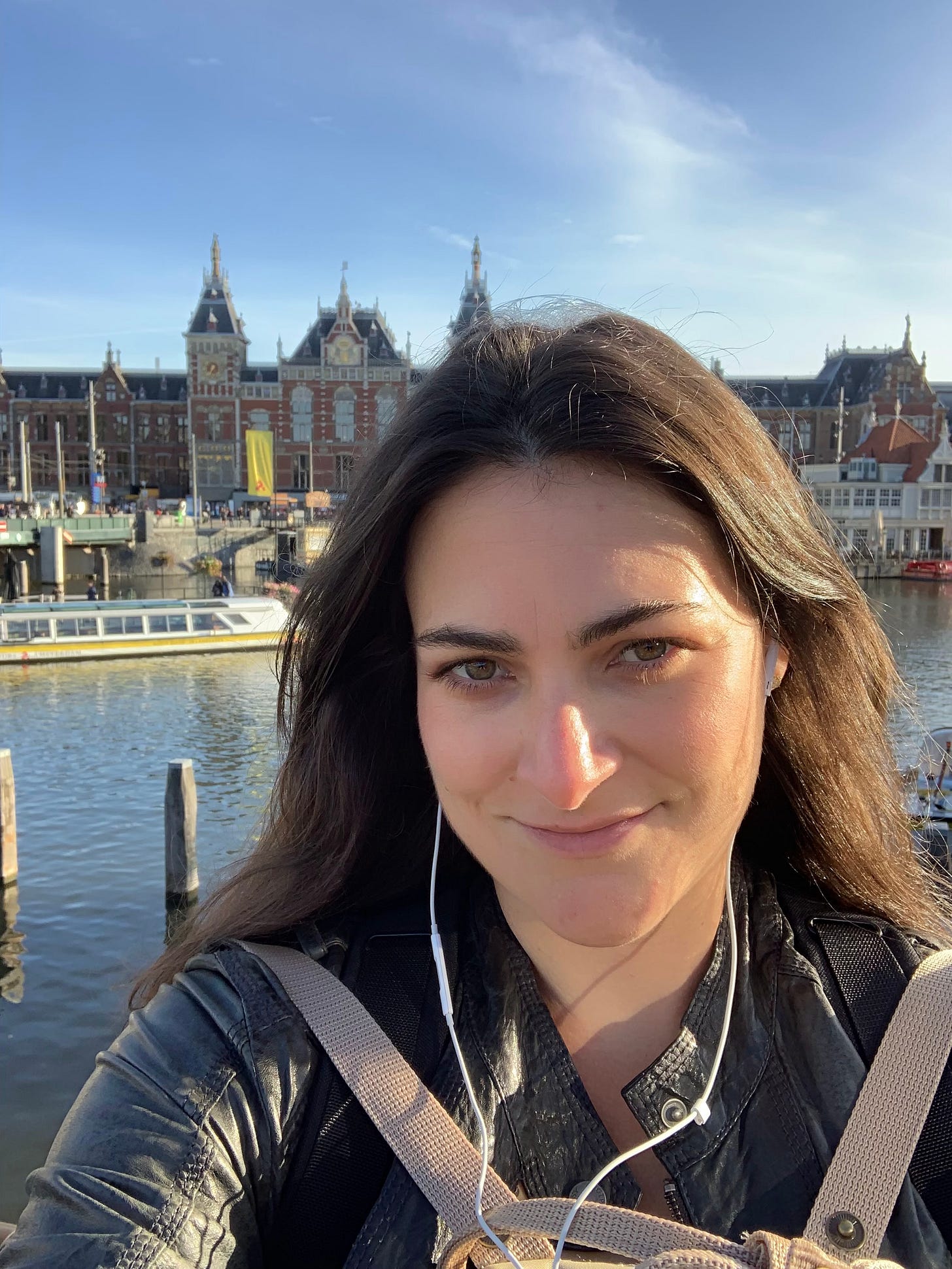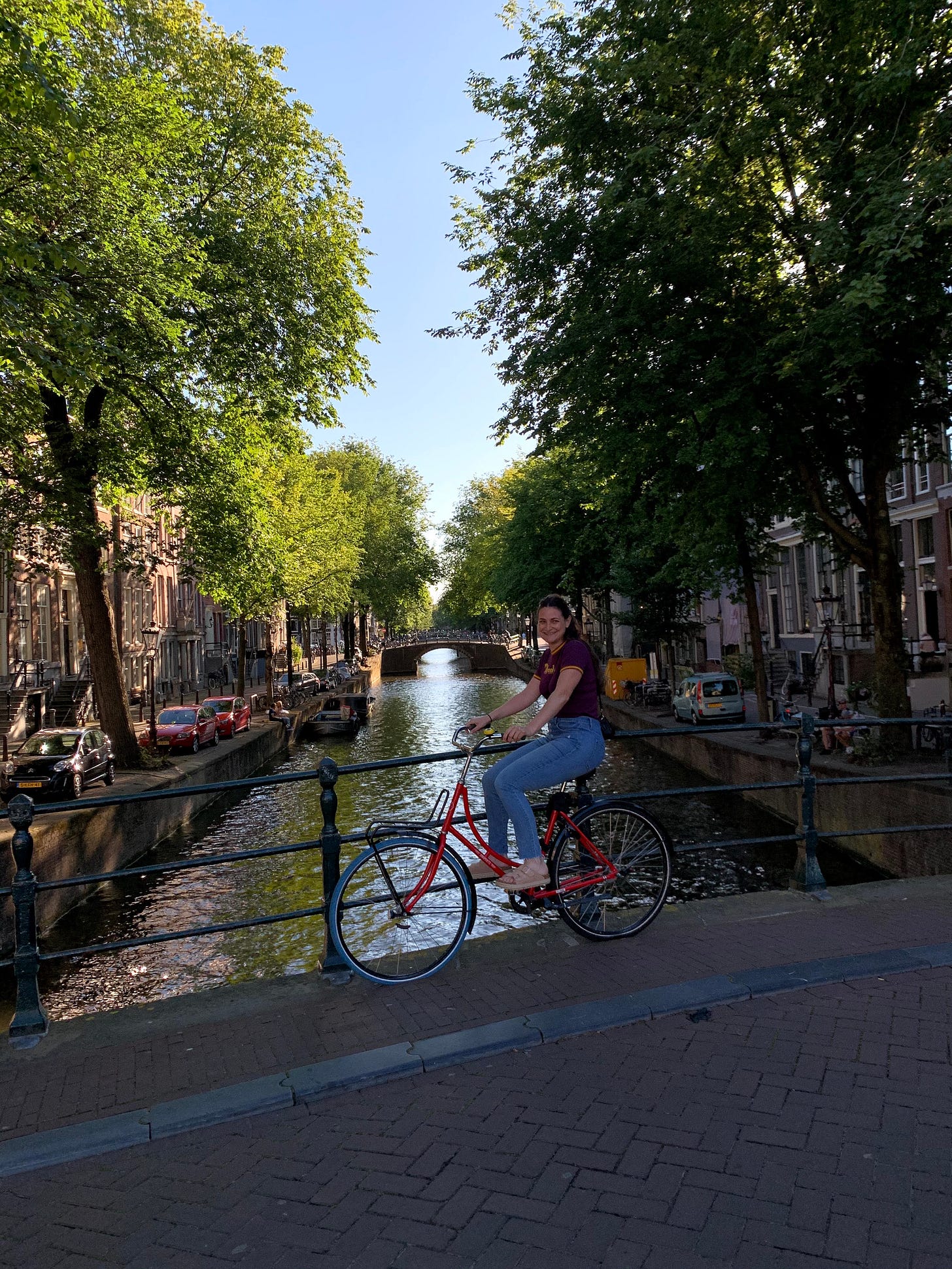Should You Move to the Netherlands?
Insights and reflections from people who've done it: Amsterdam edition.
In this edition of the Should You Move survey, Alexis Damen of The Cool Aunt provides some interesting answers about her life in Amsterdam. Like my son, Alexis is an uncommon mash-up of her parents’ two cultures—in her case, an American mom and a Dutch dad.
A bicultural upbringing comes with challenges and benefits—it gives you a passport but not the language, an understanding of the culture but not necessarily native. Most of all, it provides you plasticity of mind and the ability to adapt and thrive in almost any environment, precisely what Alexis did when she left NYC for the canals of Amsterdam.
Grab your bikes, kids! It’s time to learn all about Alexis and her cool life in Amsterdam!
1. Background:
Country of origin: United States
Country of current residence: Netherlands
Length of time living abroad: 5.5 years
2. Motivation:
What was the primary reason for your move? (e.g., work, study, retirement, lifestyle):
I was born and raised in New York by my Dutch father and American mother. I had been to the Netherlands numerous times before and always thought about what it would be like to live there, particularly in Amsterdam. But I was always afraid to go for it. When I was going through a divorce at the beginning of 2019, I decided to run off to Europe for three months. It was my Eat, Pray, Love moment. I planned to spend the last three to four weeks of my Euro trip in Amsterdam to see how I’d like to be there for an extended period. Long story short, I said fuck it, and signed a year-long contract for the canal-side apartment I was only supposed to rent for four weeks. How could I not? Five and a half years later, I’m still here. I work as a freelance content marketer and writer for tech companies, so during my travels and since settling in Amsterdam, I’ve just continued with that, and it has worked out well.
3. Practicalities:
How challenging was the visa and work permit process?
Fortunately, thanks to my dad, I didn’t have to deal with this as I have dual citizenship. When I moved here, I had to register for a BSN number (it’s like a social security number), and that’s it. I’m lucky. I also did not need a work permit as a Dutch citizen, but I had to set up my business as a self-employed person. It’s called ZZP’er here in the Netherlands (zelfstandige zonder personeel or independent with no staff). It was straightforward; I met with the Chamber of Commerce, and they helped me set it up. This process was different than the US, though; I didn’t have to set up an official business as a freelancer there.
I’ve met a few Americans here in Amsterdam who came over as freelancers via DAFT (Dutch American Friendship Treaty). I don’t have much experience with it, but because of an agreement between the US and the Netherlands, if you’re American and want to move here, setting up your small/freelance business here is a loophole to getting a visa.
What were the biggest hurdles in setting up your life abroad (e.g., housing, healthcare, banking)?
Initially, I rented an apartment from a friend's girlfriend. It worked out very well. It was smack in the center of the city and overlooked a canal. But I could only live there for one year. When my contract was up, I found another place easily because of some networking I had done when I first arrived here in Amsterdam. However, roughly a year later, that person wanted to sell her place, so I had to move again. And again, I found a great new place in de Jordaan neighborhood through an acquaintance I met when I first moved to Amsterdam. As an entrepreneur/self-employed person, I’ve become quite good at networking, especially when I first arrive in a new place, and that has paid off. But moving every year for the first three years was a pain. Luckily, all the places except for the last one were furnished. Once I knew I was going to stay here for a while, I decided to buy an apartment. The process was a bit stressful, especially because I don’t speak Dutch fluently and all the paperwork is in Dutch. It’s also harder to get a mortgage as a freelancer, but when I set my mind to something, I make it happen. I remember standing in the shower one day after being outbid on an apartment I really liked, and saying to myself, “You can do this, you can fucking do this.” Yes, I sometimes talk to myself in the shower. I wanted to give up on my search, also because buying an apartment here made putting roots down so real, but I pushed through that fear and I’m so glad I did!
4. Cultural Adaptation:
What were the most significant cultural adjustments you had to make?
The major one is that it’s very hard to make Dutch friends here as an expat. I imagine it’s like that in most countries, though. Although most Dutch people speak better English than some Americans, if you don’t speak the language, it’s hard to get into their circles. Also, while it’s very open and liberal here, it’s also quite closed, even for Dutch people. They have their circles of friends, and they don’t often mix within those circles (at least that’s what I’ve noticed). As a person who identifies as half-Dutch, I feel a bit ashamed that I don’t speak Dutch fluently. In the beginning, I took lots of Dutch courses, and I have improved, especially considering I only knew a few words when I moved here. But I would like to eventually speak it fluently.
There are many cultural nuances here that feel familiar to me. Some things make me think, Oh, that’s why my dad is like that; it’s not just him, it’s a Dutch thing. Things like being direct, practical, punctual, and poking fun at people and situations all feel familiar to me. Living in New York City for 16 years also makes you more comfortable with directness, but the Dutch take it to another level. I like it. I’d rather know what someone really thinks versus trying to read between the lines. I’m not good at that.
A fun one that shocked me in the beginning is co-ed changing rooms at gyms and fitness studios. You don’t see this everywhere, mainly just when there’s not enough space for two locker rooms. At first, I thought it was a bit weird and felt uncomfortable. But now, I think it’s great. Naked bodies are less sexualized here.
I just want to add as well that while it’s difficult to build a Dutch friend group, I have TONS of amazing (and very open) expat friends. Interestingly, I seem to get along the best with people from Mediterranean cultures, including my Turkish boyfriend. I find that funny because we are so different, but I love the contrast. It has taught me to slow down, to not always have a plan (something Dutch people love!), and to not arrive on time at house parties.
How did you handle language barriers and cultural misunderstandings?
I have not experienced many struggles with this in Amsterdam as most Dutch people here speak English very well. However, this is a struggle with my Turkish boyfriend, whom I probably would have never met if I hadn’t moved to Amsterdam, so I think it counts as part of the experience.
Adding language barriers and cultural misunderstandings to a romantic relationship, which is already so complex and delicate, is extremely challenging and often frustrating. But if you can survive it, it also keeps things interesting, and I have learned so much from him and about having a different outlook or perspective on so many things. I love it.
5. Quality of Life:
How would you rate your overall quality of life compared to the US or where you lived last?
My quality of life is 100x times better than living in New York City. I can’t say how it would compare to all of the US as I have only lived in New York and briefly in Seattle. Some of the key factors for this (at least for me) include:
The ability to cycle everywhere.
Affordable health insurance.
Affordable groceries.
Amsterdam is a smaller city than NYC, so it’s easier to meet with friends spontaneously (or maybe that’s a cultural difference?) and do things like go for a quick workout on your lunch break. Everything is close and accessible. You get spoiled, though. I complain if I have to cycle for more than 20 minutes.
Work-life balance actually exists here. It’s something that took me a while to get used to, but in the last 1.5 years or so, I have really adapted to not making my whole life about work, and I’m much happier. Here, when you go to a party or any social gathering where you’re meeting new people or hanging out with existing friends, people don’t ask, “What do you do?” Or “How’s work?” Instead, they ask things like “Have you recently been on holiday?” Or “When is your next holiday; where are you going?” It’s refreshing and also reminds me to plan more holidays!
The ease of traveling around Europe and exploring other countries is another benefit of living here. Amsterdam is a great hub if you’re interested in doing this. Regardless, the infrastructure here in Europe is more travel-friendly than in the US. It’s smaller, of course, which helps with that!
Are you satisfied with the cost of living, healthcare, and education systems in your host country?
I am satisfied, but I am a freelancer, which allows me to make more money than I would in a full-time position (doing the same thing—content marketing and writing) here in the Netherlands. At least, that’s what I think based on salary research I did when I first moved here in 2019. I’ve been lucky enough to grow my freelance business and acquire clients in Europe.
Freelancing has its ups and downs, of course, and I’m also comparing the cost of living here in Amsterdam to what I used to spend each month in New York City. Now I realize just how absurd a $15 glass of wine is. Sometimes, I can’t believe I lived in NYC for so long.
A big issue here in the Netherlands, and Amsterdam in particular, is housing. It can be very difficult to find an apartment to rent and also, compared to full-time Dutch salaries, the rents are quite high. I often question how the average non-expat person can afford it. But things like groceries are much more affordable than in the US.
Healthcare is affordable, and it’s good. Although, something I’ve found surprising is that there’s not much of an emphasis on preventive care here.
Once, I scheduled an annual “checkup” with my GP here in Amsterdam, and when I arrived at his office, he asked, “What’s your complaint?”
I explained, “I don’t have one. I’m just here for an annual checkup.”
He proceeded to ask me if I was American and then explained that here in the Netherlands, annual checkups aren’t really a thing. That they don’t like to look for a needle in a haystack and that just by looking at me he can tell that I don’t drink too much alcohol and I’m healthy.
He didn’t want to do a whole panel of blood work as I’d have to pay for that, and he didn’t think it was necessary. Healthcare feels like less of a business here, but I do think you sometimes need more than a Paracetamol (it’s like Tylenol for American readers) to feel better, and you often have to push for further care and testing.
Regarding the education system, I don’t have much insight into this as I have not studied here. But according to my research, EU/EEA students spend on average €2500 per year on undergraduate studies, which, compared to the US, is a steal! It’s more accessible, as it should be.
6. Professional Experience:
How has living abroad impacted your career?
When I first moved here in 2019, I was still finding my way as a freelancer, but being a native English speaker has helped me grow my business here in Europe. Companies hire me because they need content written in American English (and because I’m reliable and good at what I do, of course). I’ve also continued working with clients in North America, and because of what I do, my location doesn’t have a huge impact on my career. As long as I have my computer and WiFi, I can work from anywhere!
7. Advice for Future Expats:
What are the top three things you wish you knew before moving abroad?
This is a tough one because I think naivety is a superpower. The more we know about things, the less likely we are to do them. At least, that’s the case for me. I don’t like to think too hard about things before deciding because I’d rather try and fall on my face than talk myself out of something. This strategy has failed me a few times in life, but it has also brought me to where I am today—where I’m supposed to be.
The only thing that comes to mind for me is that living “in-between” your new country and the country where you grew up is sometimes difficult. Living in another country changes you, and eventually, you don’t quite fit in in either place. You’re not the same person you were when you left your home country, and you’re not a native to your new country. This is especially strange for me because I’m technically both American and Dutch. Sometimes, I get confused about which one I identify with more. Perhaps the longer I live in the Netherlands, the more Dutch I’ll become and the less American I’ll be. Time will tell.
8. What advice would you give to someone considering a similar move?
Just go for it! What’s the worst that could happen? You can always go back to where you came from if it doesn’t work out.
This has always been my mindset, but, of course, I realize it might not work for everyone. When I moved, I was single, and I could work from anywhere, which made it easier. I imagine there’s a lot more to consider if you have to agree on things with a partner and if you have kids.
Maybe my advice is, don’t get married and have kids before you explore living in another country. I’m kidding (sort of).
8. Overall Experience:
Looking back, would you say moving abroad was a positive experience? Why or why not?
Moving to Amsterdam was like a breath of fresh air. I still remember coming here with two suitcases and loving how light I felt. Everything was new and exciting. I’ve learned so much about other cultures through my circle of expat friends, and I’ve also learned a lot about myself. I like the slower pace of life here. I like who I’m becoming. After making such a big move, it’s hard to say what the future holds, but at this point in my life, I can’t imagine ever moving back to the US full-time. The Algarve region of Portugal and early retirement sound much better!
Want to read more about Alexis and her life in Amsterdam? She’s got you!
If you live abroad and would like to take the survey, please feel free to DM me.









Thanks for the feature! I loved reflecting to answer your thoughtful questions! ❤️🇳🇱 P.S. Readers - if you have any questions for me, add them here in the comments. Happy to share!
This series is always enjoyable and it's especially great when a writer you know and follow is featured. Alexis, so interesting to hear more about journey and life as an expat.
There are ideas I'm planning to explore soon in my own writing re: integrating and learning the local language. What you say about penetrating that circle of locals is very similar to what many of us experience in other major European cities. Vienna is crawling with expats and Austrians can be hard to get to know without a lot of effort and, of course, speaking the language. I was having a coffee with a friend and former colleague (from Ukraine) who speaks fluent German and works with lots of Austrians and has made a real effort in the past 3 years to get to know locals and she expressed how challenging it is. I mean, it takes a lot of effort and perseverance, so much so that I think many expats/immigrants/refugees find it easier to stick to their little bubbles (I certainly do, but then, I'm a bit of an anti-social misanthrope, so it's fine for me 🤣)
I'm very impressed with your attitude to buying a flat and the difficulty in getting a mortgage. Well done you! I've been battling Austrian bureaucracy a lot lately and I am not persistent at all, easily defeated. Much to my dismay, I take an opposite approach: 'ah fuck it, what's the point?' Probably not the best attitude, but it saves me from some short-term stress at least.